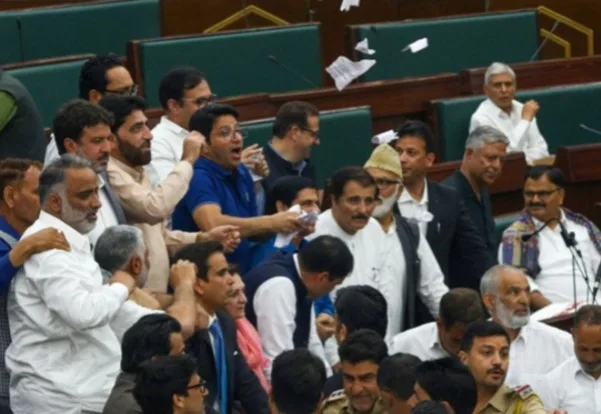By: Ahmad Ayaz
Assemblies and Parliament are not about muscle power. They are meant to represent the will of the people, frame laws, and hold the government accountable. These institutions are platforms for open debate, discussion, and informed decision-making on issues that shape our collective future.
They uphold democratic governance by checking executive overreach, allocating public resources, and safeguarding the rights and interests of the people. The strength of these institutions lies not in noise or aggression, but in the calibre, vision, and knowledge of those who occupy them.
Yet, over the last three days, what the people have witnessed in the J&K Assembly is nothing short of a dangal. Physical assaults by legislators, verbal chaos, and disorderly conduct have taken center stage. From the scuffle between rival party members to the storming of the Well of the House and even an attempted manhandling of marshals, the events have shaken public confidence in legislative propriety. Time that should have been used to address critical public issues has been squandered. Precious hours and taxpayer money have been wasted in theatrics rather than in thoughtful legislation.
When shouting matches, personal barbs, and physical scuffles take over, the sanctity of these institutions is eroded. The Assembly begins to resemble an akhada—a wrestling pit—where the goal seems to be domination, not deliberation.
People don’t vote to send gladiators. They elect representatives to solve problems, ask tough questions, and drive meaningful change. When legislatures descend into drama, the real casualty is public trust—and ultimately, the common citizen.
This recent spectacle in J&K should raise serious concerns about the quality of political culture and legislative behavior. It reflects a worrying trend where substance is being replaced with showmanship, and governance is becoming a stage for personal vendettas and ego battles. Such behavior not only weakens the legislative process but also diverts attention from the real issues facing the people of Jammu and Kashmir.
The region has its share of challenges: unemployment, infrastructural deficiencies, rising cost of living, an uncertain business climate, and long-standing political grievances. The Assembly must function as a forum to find solutions to these problems, not to deepen divisions or distract from duties.
A mature democracy requires mature leadership. Lawmakers must rise above petty politics and personal rivalries. They must set an example of civility, reason, and responsibility. It is only through focused deliberation and policy-making that the aspirations of the people can be fulfilled.
In this context, the role of political parties is equally critical. They must ensure that their members understand the gravity of their responsibilities. Internal party discipline, regular training on legislative norms, and mechanisms to curb unruly behavior are essential. Moreover, party leaderships must not glorify aggression as strength. Instead, they should reward constructive debate and sincere representation.
The Speaker of the Assembly, too, has a pivotal role in maintaining order and decorum. The chair must act impartially and firmly to ensure proceedings do not devolve into chaos. Suspension or penalties for unruly members may sometimes be necessary to uphold institutional dignity.
Media also plays a significant role in this dynamic. While reporting such incidents is necessary, sensationalism must be avoided. The focus should be on accountability, not just entertainment. Civic discourse must evolve, and the electorate should be made aware of their representatives’ behavior within the Assembly.
This episode is a moment of reckoning. It calls for introspection among politicians, political parties, institutions, and the public. Governance is serious business, and the Assembly must reflect that seriousness.
Ultimately, democracy is not just about elections alone; it’s about daily conduct, choices, and the spirit of service. If our legislative spaces turn into akhadas, we risk losing the very essence of representative governance. The real dangal is not fought in the well of the House, but in the arena of ideas, accountability, and public service.
As voters, people expect more—not just flashy speeches and tall promises, but dignified conduct, clarity of purpose, and competence. The real dangal isn’t between political opponents—it’s between governance and gimmickry. And it’s a contest where we, the people, must always be the referees.
ahmadayaz08@gmail.com






